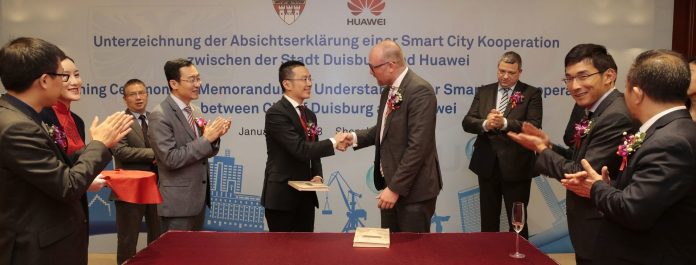Huawei is collaborating with the German cty of Duisburg, the hub for China’s trade with Europe, to implement 5G and IoT technologies. The Chinese vendor said it will provide the city, located in the west of Germany, with infrastructure solutions to underpin its initiatives with smart logistics and smart manufacturing, and ease trade between the East and West.
Duisburg has the world’s largest inland port, and represents a European hub for trade with China. It is also a focu of the Chinese government’s ‘Belt and Road’ initiative (BRI), combining overland ‘belt’ ways and maritime ‘road’ corridors between the two continents. China wants to expand maritime routes and land infrastructure networks connecting China with Asia, Africa and Europe, boosting trade and economic growth.
Huawei signed an initial memorandum of understanding with the city of Duisburg in January to make German trading centre a ‘digital benchmark city’, where its e-government infrastructure is driven by cloud computing, and its smart-city nervous system is an IoT network combining 5G with other low-power and low-latency connectivity standards.
In June, Huawei introduced its ‘Rhine Cloud’ proposition, a smart city and public service cloud platform, in partnership with IT provider DU-IT, part of Duisburg-based telecoms provider DVV. The platform is being implemented by the city of Duisburg, as part of its tie-up with Huawei in the region.
The cloud platform will provide a basic platform for Duisburg’s e-government, transportation, IoT, and unified communications. On top, Duisburg will use Huawei’s 5G, Wi-Fi, and WLAN technologies and IoT platforms to achieve real-time sensing of city components.
A smart city nervous system network will be built to advance transportation, logistics, and industrial manufacturing, enabling smart living, autonomous driving and smart city operations, Huawei said in a statement.
Delegates from the Duisburg government will tour Huawei’s campus in Shenzhen, in China, this week, with scheduled demos of smart-city and IoT implementations, a stop at a local control centre to show-off Huawei’s smart-city management platform, and visits with a couple of local 5G drone companies.
Sören Link, mayor of Duisburg, said: “We’ve had lots of exciting projects during the process of working with Huawei, which inspired us in our work. Duisburg already has a tight connection with China. Through the cooperation with Huawei, such partnership grows even stronger.”
Huawei reckons it has established “converged, innovative, open, and reliable platform technologies” in over 120 cities to date.
Yu Dong, president of industry marketing and solutions in Huawei’s enterprise department, said: “We are striving to transform Duisburg into an innovative and digital benchmark city in Western Europe, improving urban life quality, as well as enhancing the confidence of citizens, enterprises, and investors.
“We also aim to turn Duisburg into a new and open smart city ecosystem for global investors, suppliers, and partners.”
Duisburg is an active part of Germany’s smart city scene, with close involvement in Deutsche Telekom’s rollout of narrowband-IoT (NB-IoT) connectivity and smart parking services, alongside the cities of Darmstadt, Dortmund, Hamburg, Merzig and Moers.

